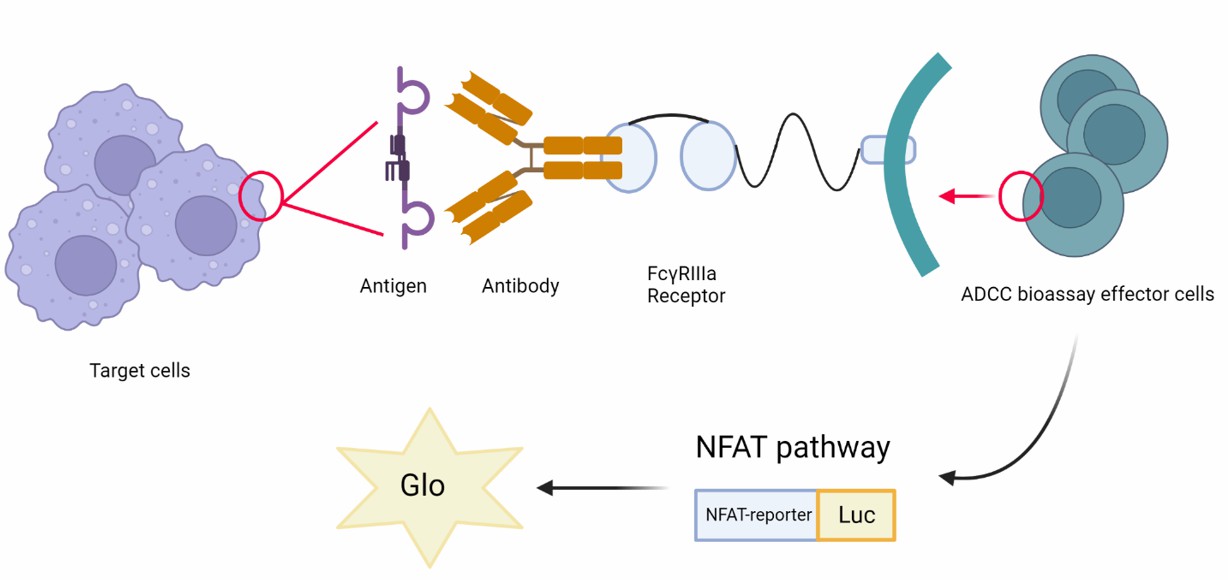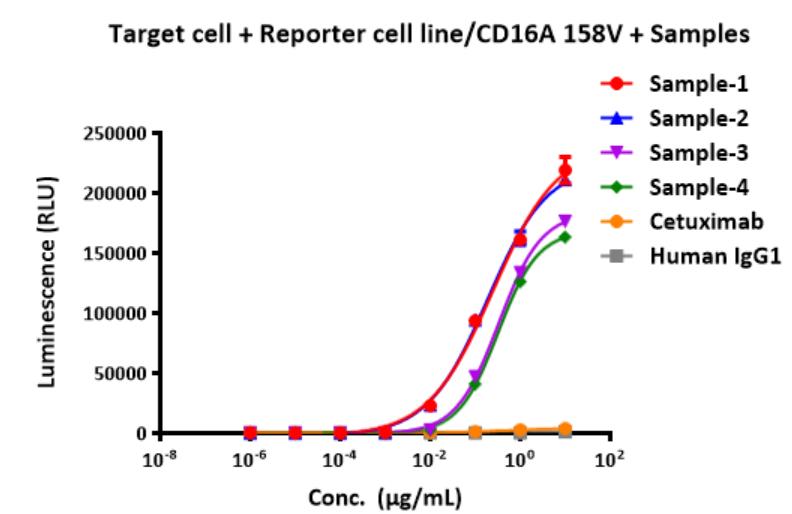ADCC Reporter Bioassay
Monoclonal antibodies (mAbs) are a rapidly increasing class of biotherapeutics. The antibody-dependent cell-mediated cytotoxicity (ADCC) is a significant mechanism of action involved in the clinical efficacy of several therapeutic antibodies. Based on our extensive experience and excellent expertise, Creative Biolabs is able to provide high-quality ADCC reporter bioassay services with reliable data to formulate the most efficient and cost-effective proposal for your preclinical studies on antibody drug development.
ADCC Reporter Bioassay
Fc-mediated ADCC is an important mechanism of action (MOA) by which antibodies target cells expressing tumor, viral, or bacterial antigens for destruction and elimination. Primary donor peripheral blood mononuclear cells (PBMCs) or purified natural killer (NK) cells that express Fc receptors on their cell surface are classically used to measure ADCC abilities. In these traditional ADCC bioassays, these effector cells are freshly isolated from blood donors and killing of target cells is often considered as an assay endpoint. Despite that traditional ADCC assays are widely used, they have exhibited a number of disadvantages, including highly variable response, the difficulty in effector cell preparation, and high background readouts.
The ADCC reporter bioassays overcome most of the limitations of the classical methods by eliminating the requirement for primary cell culture. In this assay, the primary effector cells are replaced by an engineered effector cell line expressing FcγIIIa and NFAT-RE luciferase. When binding to antibody Fc fragment, the reporter gene is activated and the luciferase activity is measured quantitively to indicate antibody ADCC bioactivity.
 Fig. 1 ADCC reporter bioassay.
Fig. 1 ADCC reporter bioassay.
Advantages of ADCC Reporter Assay
In vitro ADCC assays are routinely performed to characterize and monitor the effector functions of mAb-based therapeutics. The ADCC reporter bioassays combine a wide range of advantages, including but not limited to:
- Simple and highly accurate with low variability
- Effector cells are provided in the frozen, thaw-and-use format
- Short turnaround time
- Easily amenable to high-throughput workflows
- Suitable for applications on antibody drug discovery, development, and manufactured lot release.
Case Study
- Objective: the study aims to characterize 4 samples via in vitro reporter cell-based ADCC assay.
-
Assay Format:
E/T Ratio= 3:1;
Dilution methods: starting concentration at 10 μg/mL, dilution factor at 5-fold;
 Fig.2 In vitro reporter cell-based ADCC assay with samples.
Fig.2 In vitro reporter cell-based ADCC assay with samples.
ADCC Reporter Bioassay at Creative Biolabs
Appropriate application of ADCC assays can significantly accelerate antibody drug discovery and development. The scientific team of Creative Biolabs has the capability to perform a comprehensive series of in vitro bioassays for a range of biologically active molecules, especially mAbs and Fc-fusion proteins. With well-established laboratories and years of experience, we can offer the most comprehensive Fc function characterization services with the best quality at the most competitive prices.
Now, we provide two distinct well-established assay formats for ADCC evaluating:
- Primary ADCC Assay
- ADCC Reporter Bioassay
In addition to ADCC assays, Creative Biolabs also offers the following services regarding Fc-mediated Effector Functional Assays:
If you have any special needs in ADCC reporter bioassays or be interested in learning more about Creative Biolabs’ ADCC assay services, please contact us for more information.
For Research Use Only.
